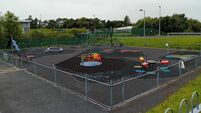Survey sheds light on issues facing teens in the West

Teenagers that have phones in their bedrooms at night report lower self-esteem and poorer mental health and school engagement.
Worrying trends in youth substance use are emerging across the western counties, with alcohol, vaping, and novel nicotine products continuing to present major challenges for public health officials.
Emmet Major, a community development worker with the Western Region Drug and Alcohol Task Force, who also coordinates the Planet Youth initiative in counties Galway, Mayo and Roscommon, says traditional smoking has seen a marked decline among teenagers - largely replaced by vaping - while other substances are gaining traction, particularly among boys.
“Vaping has become very widespread,” Mr Major told the . “Huge numbers of young people have taken it up, and many are now daily users. We’ve seen a big reduction in smoking because of that, which is one small positive.”
Cannabis use, another long-standing concern, has shown signs of a gradual decline too. Lifetime use figures - meaning teens who have tried cannabis have dropped from 17% in 2018 to 11% in the latest survey. However, the percentage of regular users, those who reported use in the last month, has remained steady at around 5%.
Alcohol, however, remains the most pressing issue.
“All of the people who show up in treatment in their 30s, 40s, and 50s with chaotic lives, jobs lost, and broken families, they all started drinking at 14, 15 or 16,” Mr Major explained. “We need to break that cycle.”
While lifetime alcohol use among teenagers has edged down slowly over recent years - from 76% to 73% - binge drinking is on the rise. The percentage of teens who reported being drunk in the past 30 days has increased from 26% in 2018 to 31% in 2022.
“That’s the figure that really concerns us,” he said. “Three in ten young people are engaging in behaviour that could lead to dependency. That’s where the future problems are likely to come from.”
Parental tolerance and availability of alcohol are also seen as contributing factors, with a rise in reports of teens getting alcohol from pubs or at home.
“There's a lot of societal and parental tolerance around alcohol, and it's a problem,” he added.
Emerging trends include the increasing use of "snus" or nicotine pouches - small, teabag-like sachets placed between the gum and cheek.
“They're very strong, they give a big buzz, and around 20% of boys have tried them. It’s much less common among girls,” the coordinator noted.
Despite being a nicotine product, these pouches are not classified as illegal substances, and access remains largely unregulated.
“Technically, they shouldn’t be sold to under-18s, but we all know kids know which shops will sell them. The same goes for vapes.”
Mr Major also highlighted concerns about what young people are vaping. While most stick to nicotine or flavour-only options, some have begun experimenting with substances like Hexahydrocannabinol (HHC) - a synthetic cannabinoid - and Tetrahydrocannabinol (THC), the psychoactive component in cannabis.
“There have been anecdotal reports of psychosis and A&E presentations linked to HHC,” he said. “It’s worrying, but there’s no solid research yet.”
Cocaine and ecstasy use among 15 and 16-year-olds remains very low, with only 1% to 2% reporting any experimentation. But that can quickly change.
“Once they hit college or start attending events like grads or socials, those numbers rise quickly," explained Mr Major.
With so many substances now available to young people, the Planet Youth project is focusing on early intervention and prevention, aiming to help teenagers make healthier choices before risky behaviours become ingrained.
“If we can do good prevention work early, we can change the outcomes later on,” he said.
Parental tolerance of teenage drunkenness has shown a notable increase over the three Planet Youth surveys and teenagers whose parents are more tolerant of drunkenness are almost three times more likely to get drunk.
This is one of the key findings of a comprehensive national survey into teenage behaviour conducted by Planet Youth, in association with local agencies across Ireland, and it was presented to a gathering of parents and club members at a Claremorris Soccer Club information evening, held in the McWilliam Park Hotel on Tuesday last. The Mayo part of the survey was conducted in co-operation with secondary schools in the country by the Western Regional Drugs and Alcohol Task Force, and the presentation was made by Gillian Conway of the Task Force.
Other key findings include that one of the most common places for teenagers to get drunk is at a friend’s house, enabled by a parent or carer. Those in parental roles can make a significant difference to the long-term health and well-being of children by agreeing not to supply alcohol to teenagers in their homes.
“There is an increase in daily and lifetime vaping rates," the report states. "The use of vaping products is unsafe for teenagers. Most vaping products contain nicotine and nicotine is a substance that is highly addictive and can harm adolescent brain development.”
The report found that parental support is a protective factor for positive mental health.
"Those pupils that report it is easy to talk to their parents about personal matters are three times more likely to report positive mental health.
“Having shared interests, regular family mealtimes, and family activities creates enjoyable time and space to chat with and listen to our teenagers. As they get older, it is important to maintain good quality parental support by communicating with them and staying connected, interested and engaged in what’s happening in their lives.”
The report also focused on screen time, concluding: “There is a significant increase in teenagers' use of social media and this latest Planet Youth survey highlighted that most of our teenagers now have a phone in their bedroom at night.
“Teenagers that have phones in their bedrooms at night report lower self-esteem and poorer mental health and school engagement. Screens should be off at least one hour before bed and kept out of bedrooms after bedtime."
On well-being indicators, the report found: “Over half of our teenagers are reporting seven hours or less of sleep every night and these teenagers are reporting poorer mental health and school engagement when compared to the teenagers sleeping longer.
“Undisturbed sleep is important for development and between eight and 10 hours is what is recommended.”
Another area studied was leisure time, with the survey finding that “unsupervised leisure time correlates with higher levels of substance use".
"Teenagers that report hanging out in the streets regularly are six times more likely to use cannabis and teens that spend unsupervised time at a friend’s home are four times more likely to get drunk.
“It is important that teenagers have access to a range of quality supervised, structured activities as they get older. Participation in supervised activities is a protective factor for substance use and promotes physical and mental wellbeing.”
On sexual health and behaviour, the survey reported: “Pornography use is associated with unsafe sexual health practices and can create misleading expectations about sexual relationships. One-sixth of our teenagers use pornography to learn about sex and a similar number of teenagers report having sexually explicit images shared online without their consent.
“Relationships and sexuality education needs to be prioritised within the Junior Cycle Well-being Guidelines and in the SPHE [Social, Personal and Health Education] curricula to better inform teenagers in matters of sexual health and behaviour,” the report said.
The survey was conducted by the Western Regional Drugs Task Force, using the Planet Youth Ireland model.
Planet Youth Ireland is an initiative to promote well-being among adolescents. Supported by Planet Youth ehf in Reykjavik, the initiative is based on the Icelandic Prevention Model and uses a “ground-up” approach whereby the local regions enter into a process with researchers, local governmental agencies, the education sector, and young people themselves. These regions conduct surveys with adolescents (post-Junior Cert) every two years and use this information to inform evidence-based interventions at a local level. Currently, 12 regions across Ireland are now Planet Youth partners.
Ann Marie Gilmore, the Child Welfare Officer with Claremorris AFC, was one of the organisers of the event.
“Several parents approached the committee and asked for a workshop or some way of getting information,” Ann Marie told the . “They wanted someplace where parents could get some information on where drugs and alcohol fit in our teenagers’ lives in Claremorris. They wanted to know if there were drugs in Claremorris; if there were, what drugs were there.
“It seemed to have come from the death of a young person - not in the Claremorris area, but outside - that had prompted parents to chat about this amongst themselves and then start asking questions about what's going on out there. What's it like for our teenagers?
“I work with Tusla in child protection and over the years, I've attended training sessions with the Western Region Drug and Alcohol Task Force and Gillian would have given the presentations, and we always came away from Gillian's workshops very equipped, and much more knowledgeable and reassured and confident about addressing the issues of drugs and alcohol that come up in the houses I work in. I rang Gillian and she said she put together a presentation specific to Claremorris., because of the great Planet Youth information that's out there, she was able to make this local, so that's how it all came about.
“We have almost 500 underage registered, and then we have the two junior teams. So it's probably about 600 registered altogether, but about 500 are under 18."




